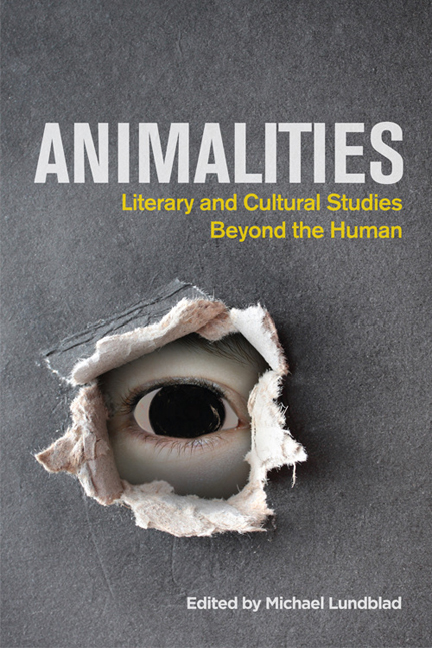Book contents
- Frontmatter
- Contents
- List of Figures
- Acknowledgments
- Introduction: The End of the Animal – Literary and Cultural Animalities
- 1 Each Time Unique: The Poetics of Extinction
- 2 Posthuman New York: Ground Zero of the Anthropocene
- 3 J. G. Ballard's Dark Ecologies: Unsettling Nature, Animals, and Literary Tropes
- 4 Staging Humanimality: Patricia Piccinini and a Genealogy of Species Intermingling
- 5 “Sparks Would Fly”: Electricity and the Spectacle of Animality
- 6 The Nature of Birds, Women, and Cancer: Terry Tempest Williams's Refuge and When Women Were Birds
- 7 Animality, Biopolitics, and Umwelt in Amitav Ghosh's The Hungry Tide
- 8 Looking the Beast in the Eye: Re-animating Meat in Nordic and British Food Culture
- 9 Love Triangle with Dog: Whym Chow, the “Michael Fields,” and the Poetic Potential of Human-Animal Bonds
- 10 Bestial Humans and Sexual Animals: Zoophilia in Law and Literature
- Notes on Contributors
- Index
9 - Love Triangle with Dog: Whym Chow, the “Michael Fields,” and the Poetic Potential of Human-Animal Bonds
Published online by Cambridge University Press: 07 December 2017
- Frontmatter
- Contents
- List of Figures
- Acknowledgments
- Introduction: The End of the Animal – Literary and Cultural Animalities
- 1 Each Time Unique: The Poetics of Extinction
- 2 Posthuman New York: Ground Zero of the Anthropocene
- 3 J. G. Ballard's Dark Ecologies: Unsettling Nature, Animals, and Literary Tropes
- 4 Staging Humanimality: Patricia Piccinini and a Genealogy of Species Intermingling
- 5 “Sparks Would Fly”: Electricity and the Spectacle of Animality
- 6 The Nature of Birds, Women, and Cancer: Terry Tempest Williams's Refuge and When Women Were Birds
- 7 Animality, Biopolitics, and Umwelt in Amitav Ghosh's The Hungry Tide
- 8 Looking the Beast in the Eye: Re-animating Meat in Nordic and British Food Culture
- 9 Love Triangle with Dog: Whym Chow, the “Michael Fields,” and the Poetic Potential of Human-Animal Bonds
- 10 Bestial Humans and Sexual Animals: Zoophilia in Law and Literature
- Notes on Contributors
- Index
Summary
What kind of lover is a dog lover? The question pushes boundaries, animates taboos. We generally use “dog lover” in a way that is desexualized. Moreover, we designate a relationship between one human being and many animals, but we do not see that cross-species bond as involving other human beings. “Dog lover” reaffirms a notion of human subjectivity, singularity, and individuality, even as it allows “dog” to stand for one canine and for many or all canines simultaneously. “Lover” is an affect translated into a subjectivity, and one that cuts in one direction – it is an assertion of human emotion, not of canine feelings. It is the human affect of love that defines the dog lover's subjectivity. The dog is the object of love, not himself the lover.
What if we were to reopen the term to all its inappropriate, embarrassing, multidirectional, derogatory, and dangerous possibilities? More importantly: why would we do so? As Alice Kuzniar observes in Melancholia's Dog (2006), “one of the most unutterable aspects of closeness with pets is the shamefulness about intimacy with them, as if it might be construed as bordering on bestiality or as if to love dogs betrayed an inability to love humans.” If Kuzniar is right, and one consequence of this shame is the melancholic disavowal of human attachment to animals, then what would the alternative look like? What would it mean to embrace human attachment to animals in joyful avowal? It is precisely this question that Michael Field addresses in Whym Chow (1914), a volume of poetry that reorients our understanding of the “biopolitics of everyday life” by exploring how affect that crosses species lines might open up queer models of subjectivity and kinship.
When “he” published his first volume of poetry, Michael Field became an instant success. But shortly after, “his” friend Robert Browning revealed that Michael Field was a pseudonym for Katherine Bradley and Edith Cooper. The career of these two women – who were aunt and niece, lover and lover, co-writers even of diaries – never recovered from the revelation of their sex, even in the platonic sense.
- Type
- Chapter
- Information
- AnimalitiesLiterary and Cultural Studies Beyond the Human, pp. 190 - 210Publisher: Edinburgh University PressPrint publication year: 2017



